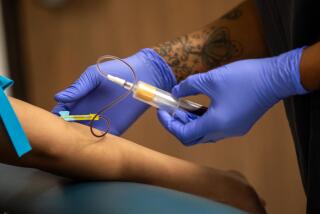Recipients of Blood Urged to Test for AIDS
- Share via
In a development with potential national implications, four San Francisco area hospitals are encouraging about 50,000 patients who received blood transfusions between 1978 and March, 1985, to be tested for infection with the AIDS virus.
The publicity surrounding the separate mailings by the UC Medical Center, San Francisco, and by Kaiser Permanente hospitals in San Francisco, San Rafael and Vallejo is likely to force hospitals across the country to decide if they have a similar obligation to notify their transfusion patients and offer free antibody testing for the acquired immune deficiency syndrome virus.
The UC San Francisco mailing, which was completed last month, and the Kaiser mailing, which is set to begin around the end of the year, are also being debated in the Bay Area.
Both the notifications involve blood collected by the San Francisco-based Irwin Memorial Blood Bank, which supplies blood from about 100,000 donors each year to 43 hospitals in eight Northern California counties, including San Francisco, Marin and Napa. The other 39 hospitals have not announced similar plans.
“We were cautioned against this for fear that we would alarm individuals who had no reason to be concerned,” said Dr. Elizabeth Donegan, director of the blood bank at UC San Francisco. “But we felt that we had a responsibility to notify people of their potential exposure in order to do what we could to stop the spread of this infectious disease.”
AIDS-tainted blood from Irwin accounted for 69 of the approximately 1,000 transfusion-related AIDS cases reported nationally as of the end of October, as well as an additional 181 AIDS virus infections in individuals who have yet to develop AIDS, according to Dr. Herbert Perkins, the blood bank’s executive director. More than 15 lawsuits by infected individuals or their relatives are pending.
In Southern California, Dr. Steven Kleinman, associate medical director of American Red Cross Blood Services in Los Angeles and Orange counties, said he was unaware of any similar plans by Southern California hospitals, including the nine Kaiser Permanente hospitals, to contact all of their transfusion recipients. About 90 transfusion AIDS cases have been reported in Los Angeles County, 20 in San Diego County and 10 in Orange County.
“It is a difficult issue for hospitals to define whether they have this obligation or not,” Kleinman said.
About 12,000 people now living in the United States, including about 1,000 in Los Angeles and about 800 in the San Francisco area, are estimated to harbor transfusion-acquired AIDS virus infections. Public health officials believe that the majority of these infected individuals are not aware of their infections and therefore are a potential risk to others through sexual or blood-borne contact.
Infection Period
Most of these infections probably occurred between 1981 and 1983 before members of AIDS “high-risk” groups, such as intravenous drug users and homosexual men, were advised to refrain from donating blood.
Since screening of the blood supply with AIDS antibodies tests began 2 1/2 years ago, the number of AIDS-contaminated blood donations has declined dramatically, to an estimated one in 50,000 units in San Francisco, one in 80,000 in Los Angeles and one in 200,000 nationwide.
The UC San Francisco mailing, to about 17,000 patients, and the Kaiser mailing, which is expected to notify more than 30,000 current and former Kaiser members, expand upon recommendations made last March by the federal Centers for Disease Control.
The federal agency advised physicians to “consider offering” AIDS antibodies tests to “some” patients who received blood transfusions between 1978 and the spring of 1985, specifically those who were transfused in areas with a high incidence of AIDS and those who received large numbers of units.
Previously, efforts to contact transfusion recipients had been primarily directed at individuals who were considered to be at high risk for receiving contaminated blood, such as those who received blood from donors who later developed AIDS.
After reviewing the CDC report, UC San Francisco physicians discussed various options before deciding on a one-time effort to notify all of the hospital’s transfusion recipients over the seven-year period, according to Donegan.
Extent of Response
So far, about 1,070 transfusion recipients have responded to the mailing, including 122 who said they were unaware that they had received blood transfusions during their hospitalizations, according to Donegan. Nearly 4,000 letters have been returned by the post office as “address unknown.”
Of those who were notified, about 550 have been tested at UC San Francisco. About 10--or 2%--are infected with the AIDS virus. Additional transfusion recipients may have been tested elsewhere.
Northern California Kaiser officials decided to follow UC San Francisco’s lead after receiving a letter in mid-August from Irwin Memorial’s Perkins.
The letter stated that the risk of acquiring the AIDS virus from an Irwin blood transfusion between 1981 and 1983 “may have approached 1 in 100,” a risk much higher than Kaiser officials said they had previously realized.
Kaiser said it expects to begin the notification around the end of December, after it finishes identifying the patients who need be contacted and gears up administratively for the project.
UC San Francisco set up a toll-free telephone number to provide additional information for patients and their families and made counselors available to work with those who decided to be tested; Kaiser has similar plans. “There is no increased risk or threat to people if they hold off until they get official notification from us,” Daniel Danzig, a Kaiser spokesman said.
While endorsing the CDC recommendations, the Irwin Memorial Blood Bank has taken no position on whether the 39 other hospitals to which it supplies blood should establish notification programs similar to UC San Francisco’s and Kaiser’s.
“We feel this is an issue which needs to be decided by each hospital in consultation with its own attorneys,” Perkins said.
More to Read
Sign up for Essential California
The most important California stories and recommendations in your inbox every morning.
You may occasionally receive promotional content from the Los Angeles Times.













